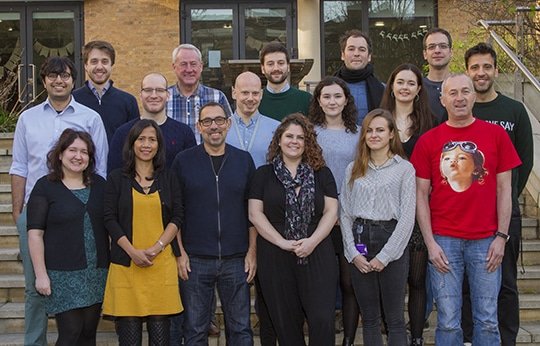
Two acclaimed Greek scientists, Professor Tony Kouzarides and Dr. Konstantinos Tzelepis, both of Cambridge University in the UK, are leading the research on a breakthrough drug which could treat a rare type of leukemia.
Based on a previous study of his from 2017, Professor Kouzarides and his colleagues at STORM Therapeutics, a Cambridge spinout associated with his team, and the Wellcome Sanger Institute, have identified a drug-like molecule that can inhibit the action of an enzyme associated with acute myeloid leukemia (AML).
Even more importantly, the new approach of targeting these enzymes could be used to treat a wide range of cancers in the future.
Greek scientist takes breakthrough leukemia discovery further
AML is characterized by the rapid growth of abnormal white blood (myeloid) cells that build up in the bone marrow and blood and interfere with normal blood cell production. Like all blood cancers, it proceeds rapidly and aggressively, usually requiring immediate treatment, and affects both children and adults.
Around 3,100 people are diagnosed with the condition every year in the UK and over 10,000 in the USA, with the average age of diagnosis estimated at 63 years.
The enzyme that Professor Kouzarides and his team singled out in the 2017 study and named METTL3 was proven to play a key role in the development and maintenance of the disease as it becomes over-produced in certain cell types.
In the new research, the team has been able to show that a a drug-like molecule, named STM2457, was able to block the cancerous effect caused by over-expression of the enzyme.
Not only did it reduce the growth and proliferation of these cells significantly on cell lines derived from patients with AML, it also induced apoptosis – the “cell death” process that kills off the cancerous cells.
In immunocompromised mice with transplanted cells from patients with AML, the STM2457 substance prolonged the lifespan of the mice considerably and reduced the number of leukemic cells in the mouse bone marrow and spleen, while showing neither toxic side effects nor an effect on body weight.
Mastering RNA technology to provide solutions
As described in his profile page on The Gurdon Institute website, Professor Kouzarides’ lab is involved in characterizing the pathways that mediate and control DNA and RNA.
“We try to understand the cellular processes they regulate, their mechanism of action and their involvement in cancer. Our focus at the moment is modifications of messenger RNA (mRNA) and non-coding RNA”, the laboratory explains.
His team has been developing sensitive technologies on these low-abundance RNAs to detect modifications, such as specific antibodies, chemical reactivity assays and mass spectrometry, and show that these function to regulate mRNA translation and microRNA processing.

“Proteins are essential for our bodies to function and are produced by a process that involves translating our DNA into RNA using enzymes. Sometimes, this process can go awry with potentially devastating consequences for human health”, Professor Kouzarides points out.
“Until now, no one has targeted this essential process as a way of fighting cancer. This is the beginning of a new era for cancer therapeutics.”
Over the years, the acclaimed Greek scientist has been awarded the Wellcome Trust medal for research in biochemistry related to medicine (UK), the Tenovus Medal (UK), the Bodossaki Foundation prize in Biology (Greece), the Bijvoet Medal (Holland), the Biochemical Society Award Novartis Medal and Prize (UK) and the Heinrich Wieland Prize (Germany).
Clinical trials roll-out in view
The group leader of the research, Dr. Konstantinos Tzelepis from the Milner Therapeutics Institute at the University of Cambridge and the Wellcome Sanger Institute, is confident that his team could begin clinical trials to test successor molecules in patients as early as next year.
“This is a brand-new field of research for cancer and the first drug-like molecule of its type to be developed. Its success at killing leukemia cells and prolonging the lifespans of our mice is very promising.
“We also believe that this approach – of targeting these enzymes – could be used to treat a wide range of cancers, potentially offering us a new weapon in our arsenal against these terrible diseases,” he adds.
Michelle Mitchell, Chief Executive of Cancer Research UK, which supports the team’s work, says that “research like this can’t come soon enough.”
“We look forward to seeing the outcomes of the phase 1 trial and the benefits it may have for AML sufferers and their families in the future,” she comments.
The research was also supported by the European Research Council, Wellcome, the Kay Kendall Leukemia Fund, and Leukemia UK.
Related posts:
Views: 0
 RSS Feed
RSS Feed

















 April 27th, 2021
April 27th, 2021  Awake Goy
Awake Goy 
 Posted in
Posted in  Tags:
Tags: 
















